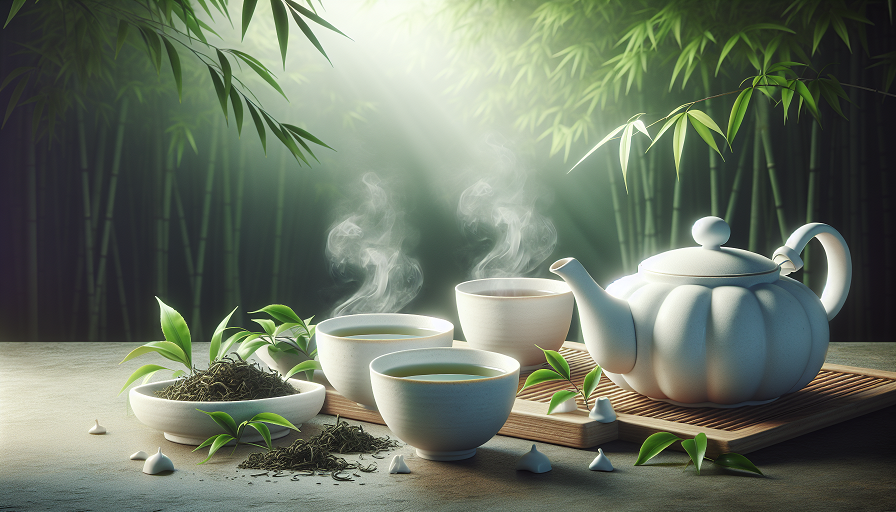
There’s something timeless about sipping a warm cup of Japanese green tea. Beyond its comforting aroma and rich taste, Japanese green tea carries a profound ability to clear the mental fog, helping us feel sharper and more focused. For centuries, monks have used green tea as an aid for meditation and concentration, and now modern science is starting to understand why.
Contents
- Understanding the Key Compounds in Japanese Green Tea
- The Balance of Caffeine and L-theanine for Better Focus
- Japanese Green Tea and Stress Reduction
- Protecting Brain Health with Antioxidants in Green Tea
- Green Tea’s Role in Enhanced Memory and Learning
- Incorporating Japanese Green Tea into Your Daily Routine
Understanding the Key Compounds in Japanese Green Tea
Japanese green tea is loaded with unique compounds that set it apart from other teas and give it a distinct impact on brain health. The big players in this lineup are caffeine, L-theanine, and antioxidants called catechins, which work in harmony to support mental clarity and focus.
Caffeine: A Gentle Wake-Up Call
Unlike coffee’s jolt, the caffeine in Japanese green tea is gentler, offering a steady lift without the crash. Caffeine, as many of us know, is a stimulant that can improve attention and alertness. In green tea, the caffeine content is balanced, giving just enough stimulation to wake the brain up without leading to jitteriness.
L-theanine: Nature’s Relaxation Agent
What really makes Japanese green tea unique is its content of L-theanine, an amino acid known for promoting relaxation without drowsiness. L-theanine works by increasing the brain’s alpha wave activity, which puts us in a calm, focused mental state – the sweet spot for clarity and concentration. This is one reason monks relied on green tea to maintain a state of “alert relaxation” during long hours of meditation.
Catechins: Powerful Brain-Protecting Antioxidants
Catechins, especially a type called EGCG (epigallocatechin gallate), are potent antioxidants found in Japanese green tea. They help protect the brain from oxidative stress – the kind of damage caused by free radicals that can cloud thinking over time. Think of catechins as defenders for your brain cells, keeping them healthy and firing smoothly.
The Balance of Caffeine and L-theanine for Better Focus
The combination of caffeine and L-theanine in Japanese green tea creates a unique effect on the brain that you won’t find in most other drinks. While caffeine alone can sometimes lead to a “wired” feeling, L-theanine counteracts this, bringing calm to the stimulation. It’s the perfect pair – a partnership between calm and energy that helps to enhance focus without feeling frazzled.
This balancing act gives you the alertness to tackle mental tasks, paired with a steady hand that makes it easier to sustain focus. When caffeine and L-theanine work together, they not only improve concentration but also make it easier to resist distractions, a key part of staying focused and mentally clear.
How It Works
Studies have shown that this duo boosts cognitive performance more than either substance alone. Together, they enhance what’s called “selective attention,” the mental ability to zero in on the task at hand while filtering out distractions. Think of it as a natural filter, allowing your brain to work more efficiently and retain information better.
Japanese Green Tea and Stress Reduction
One of the biggest mental barriers we face in daily life is stress, which can easily cloud our thoughts and hinder concentration. Japanese green tea plays a unique role in reducing stress and supporting mental well-being, which naturally enhances clarity and focus.
L-theanine’s Role in Reducing Anxiety
L-theanine doesn’t just aid in focus – it’s a natural stress reducer. By promoting the release of serotonin and dopamine, L-theanine helps regulate mood, creating a sense of calm that’s invaluable when trying to focus. Drinking green tea can feel like hitting the reset button on a frazzled mind, making it easier to settle into a peaceful, productive state.
Slow Sipping as a Form of Mindfulness
In Japan, tea drinking is more than just a routine – it’s a ritual. The process of carefully brewing and sipping green tea can be a form of mindfulness, which itself has mental clarity benefits. Taking a few moments to enjoy the experience of tea can improve concentration, slow racing thoughts, and create a mental space that encourages focus. It’s a practice that invites us to step back, relax, and return to our work refreshed.
Protecting Brain Health with Antioxidants in Green Tea
Japanese green tea isn’t just a quick fix for focus – it supports brain health over the long haul. Catechins, especially EGCG, have been shown to protect the brain from oxidative damage and inflammation, both of which can impair mental clarity over time.
Fighting Oxidative Stress
Oxidative stress is one of the biggest threats to mental clarity as we age. This process damages cells and tissues in the brain, contributing to the mental fog that can creep up over time. The antioxidants in Japanese green tea, including catechins, work like a shield, protecting your brain cells and promoting healthier, clearer thinking over the years.
Reducing Inflammation in the Brain
Chronic inflammation is linked to cognitive decline and mental health issues like anxiety and depression. The anti-inflammatory properties of EGCG help reduce this risk, creating a more balanced, resilient brain that’s better equipped to handle stress and stay clear-headed. Over time, regular consumption of green tea can become a natural defense against cognitive decline.
Green Tea’s Role in Enhanced Memory and Learning
Clarity and focus are crucial for learning and memory, and Japanese green tea plays a role here too. Research has found that EGCG and L-theanine can both enhance cognitive functions related to memory and information processing.
Boosting Neurotransmitters for Memory Retention
The compounds in green tea stimulate neurotransmitters like dopamine and serotonin, which are critical for memory retention and recall. This means that sipping green tea not only clears your mind but also supports the mental processes that help you absorb and retain new information.
In a sense, green tea is the ideal study buddy or work partner – it helps you focus in the moment and supports long-term memory, allowing you to remember what you learn and keep track of important details with greater ease.
Supporting Neuroplasticity
Neuroplasticity, or the brain’s ability to reorganize and form new connections, is vital for learning and memory. Studies suggest that the antioxidants in green tea can enhance neuroplasticity, making it easier for the brain to adapt, learn, and store information. This is particularly helpful as we age, when neuroplasticity naturally begins to decrease.
Incorporating Japanese Green Tea into Your Daily Routine
Ready to see these benefits for yourself? Here are some tips for adding Japanese green tea to your day in a way that maximizes its focus-enhancing properties.
- Start with quality tea: Opt for a high-grade Japanese green tea to get the most out of the nutrients and compounds that support brain health.
- Experiment with timing: Some people find they get the most mental clarity when drinking green tea mid-morning or in the afternoon as a way to refocus.
- Use tea time as a break: Take a few mindful moments while you drink your tea – let the process itself become a mental reset.
Trying Different Japanese Green Teas
Matcha, sencha, and genmaicha are all popular options, each offering a unique flavor profile and slightly different levels of caffeine and L-theanine. Experiment to see which one suits you best and aligns with your focus needs.
If you’re looking for a gentle, natural way to boost mental clarity, Japanese green tea could be the answer. Its unique blend of caffeine, L-theanine, and antioxidants works to promote focus and protect the brain, making it an ideal daily ritual for those who value sharp thinking and a calm mind.

